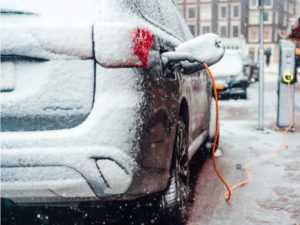
By Hrecheniuk Oleksii @ Shutterstock.com
Batteries have always had problems in extreme temperatures, that why it is interesting to see such surprise at revelations from a AAA study that suggest that electric vehicles perform worse in hot and cold temperatures than they do in milder weather. Lucas Laursen reports for Fortune:
Not too hot and definitely not too cold–that’s when electric car batteries work best.
“Batteries are like humans,” Anna Stefanopoulou, director of the University of Michigan’s Energy Institute told Wired: they do best at temperatures between 40°F and 115°F.
In results that are unlikely to shock the many frustrated EV owners who vented on social media during the polar vortex, Stefanopoulou’s claim is backed up by the results of a new AAA study, which says that electric car batteries lose as much as 41% of their potential driving range when the outside temperature is 20°F (and when the heater is turned on).
The AAA study used five sample cars, each from a different manufacturer, with a minimum 100-mile range and wide availability in the U.S. It compared performance at three temperatures: 20°F, 75°F, and 95°F, per the SAE International standard, used in the automotive industry.
At 20°F, the cars lost an average of 12% of their range, relative to the baseline temperature of 75°F, whereas they lost only 4% in the warmer 95°F scenario.
Firing up the heater or air conditioner took things to a whole new level: in the cold, with their heaters on, cars lost 41% of their range and in the heat, with the air conditioning on, they lost 17%.
As a result, electric cars cost more to operate in the cold than in moderate temperatures. AAA calculates that running the heater in the cold adds about 2.5 cents per mile in their test sample of electric cars.
Read more here.
